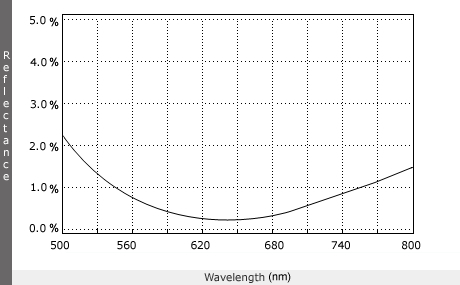Coating substrates is one of our core competences.
We have been coating precision optic components with optically effective layers ever since 1948. Over the years, technical specifications and possibilities have radically changed.
We now have several high-vacuum plants, an ultrasound cleaning and drying plant at our disposal to treat the substrates. We also build our own equipment e.g. for asymmetrical prisms. Coated substrates are inspected and documented with a "Lambda 900" PE spectral photometer.
Reflection-reducing coatings increase the light transmission of optical systems. This is particularly important for the light intensity of multilens optical systems such as objectives. Another benefit of anti-reflection coatings is their capability to strongly reduce scattered light losses between the lenses. Our product portfolio covers single- and multiple layer anti-reflection coatings, anti-reflection coatings for laser applications and coatings for applications in ultraviolet (UV), visual (VIS) and infra-red (IR).
Metallic reflection coatings enhance reflection and are used in many optical instruments for light deflection. We coat glass, metal and plastic. The choice of coating material depends on the reflection requirements in the defined wavelength range. We use aluminium, gold, silver and chrome-nickel, either with or without protection coating for the VIS, UV and IR ranges.
Metallic thin-film systems are vaporized onto substrates to attain specific reflection and transmission values. Depending on the type of metal and the thickness of the layer, metallic splitter coatings are able to separate customer-specific wavelength areas.
Compared with conventional metallic reflection coatings, the advantages of dielectric reflection coatings are their climate resistance, mechanical stability and high reflection combined with relatively low absorption. These properties are crucially important for many optical applications involving extreme thermal and mechanical stress.
Unlike metallic splitter coatings, dielectric splitter coatings enable absorption-free light conditions. Dielectric splitter coatings are used in various filters and particularly in laser technology and reference metrology.
The deflection and separation of light beams in different intensities, directions or wavelength ranges can also be controlled by thin-film vaporization. Either a metallic or a dielectric coating is chosen, depending on requirements and application. The above-mentioned advantages of dielectric reflection coatings play a decisive role here, too.
Befort Wetzlar is mentioned and recommended in the relevant Internet forums as a coater of telescope mirrors. We serve customers in astronomy, natural sciences and technology, supporting users with our technical know-how. After all, you can't enjoy the best possible view of the universe without maximum reflectivity and robust mirrors

AL mit reflexionserhöhender Schutzschicht (94%)

Standard-AL-Belag mit Quarzschutzschicht (R ca. 88% VIS)

V Coating Schwerpunktentspiegelung
Im Bereich 250 nm < λ < 1064 nm

AR Einfache Entspiegelung

Mehrfachentspiegelung VIS

HR dielektrischer Spiegel
Im Bereich 400 nm < λ < 1100 nm

AR für λ = 633nm

Goldspiegel

Teildurchlässiger Spiegel / R:T=50:50 / ± 5% VIS
